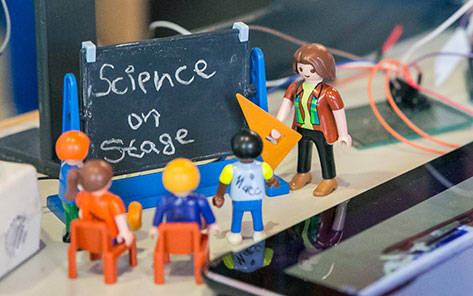Murder, microbes and Myrmicinae: Science on Stage Germany Inspire article
Who murdered Sir Ernest? How do you organise an astronomical school exchange? Why don’t ants have kings? How can you build an ECG for a Venus fly trap? What exactly happens in your intestines?

Stage Deutschland eV
These were just some of the questions raised – and answered – at this year’s Science on Stage Germany event on 18–20 November 2016, during which around 100 primary- and secondary- teachers gathered in Berlin to share their favourite science-teaching ideas and gather inspiration from colleagues.
At the heart of the event was the fair, where selected teachers presented a dazzling array of hands-on activities, project ideas and ingenious homemade gadgets across 43 stands. In addition, ideas from previous festivals were demonstrated in seven workshops – including producing photographs without a dark room, and teaching with microbial fuel cells. Some of the activities will undoubtedly feature in future issues of Science in School, but details of all the projects are available on the Science on Stage website.
For example, two chemistry teachers introduced their students to light and sound spectra using a murder mystery. Two science teachers – one in Germany and one in the Netherlands – tired of the usual language exchange, decided to give theirs a scientific twist. A university professor shared ideas for investigating ant behaviour and ecology in the classroom. A physics teacher put his computer soundcard to good use – as the basis of a bewildering array of scientific gadgets for the school laboratory. And two teachers from a special school took a very close look at our digestive system.
To present a project at a national Science on Stage event is already a privilege. Twelve participants, however, were selected to go further – to represent Germany at the Science on Stage Europe international festival 2017 in Debrecen, Hungary. There, 400 teachers from 29 European countries will exchange ideas with their international colleagues and set up collaborations for the next few years. The national delegations are already being finalised, but teachers keen to experience the unique atmosphere of Science on Stage can attend the open day.





